#Plant-Based Meat Market Trends
Explore tagged Tumblr posts
Text
The global plant-based meat market size reached USD 16.7 Billion in 2024. IMARC Group expects the market to reach USD 100.3 Billion by 2033, exhibiting a growth rate (CAGR) of 21.92% during 2025-2033. The rising popularity of sustainable food options, owing to the increasing consumer ethical and animal welfare considerations, the wide availability of plant-based meat via online platforms, the growing culinary diversity, etc., are some of the primary factors driving the market growth across the country.
0 notes
Text
The global plant-based meat market size is estimated to valued at USD 7.9 billion in 2022 and is projected to reach USD 15.7 billion by 2027, recording a CAGR of 14.7%, in terms of value during the forecast period.
#Plant-based Meat Market#Plant-based Meat#Plant-based Meat Market Size#Plant-based Meat Market Share#Plant-based Meat Market Growth#Plant-based Meat Market Trends#Plant-based Meat Market Forecast#Plant-based Meat Market Analysis#Plant-based Meat Market Report#Plant-based Meat Market Scope#Plant-based Meat Market Overview#Plant-based Meat Market Outlook#Plant-based Meat Market Drivers#Plant-based Meat Industry#Plant-based Meat Companies
0 notes
Text
The global plant-based meat market size is estimated to valued at USD 7.9 billion in 2022 and is projected to reach USD 15.7 billion by 2027, recording a CAGR of 14.7%, in terms of value during the forecast period.
#Plant-based Meat Market#Plant-based Meat#Plant-based Meat Market Size#Plant-based Meat Market Share#Plant-based Meat Market Growth#Plant-based Meat Market Trends#Plant-based Meat Market Forecast#Plant-based Meat Market Analysis#Plant-based Meat Market Report#Plant-based Meat Market Scope#Plant-based Meat Market Overview#Plant-based Meat Market Outlook#Plant-based Meat Market Drivers#Plant-based Meat Industry#Plant-based Meat Companies
0 notes
Text
Global Plant-Based Meat Market Is Estimated To Witness High Growth Owing To Health Consciousness and Growing Trend of Veganism

The global Plant-Based Meat Market is estimated to be valued at USD 5.06 Bn in 2021 and is expected to exhibit a CAGR of 19.3% over the forecast period 2022-2030.
A) Market Overview:
The Plant-Based Meat Market refers to meat substitutes that are derived from plant sources and offer a healthier and more sustainable alternative to traditional meat products. These products are widely used by individuals who follow vegetarian, vegan, or flexitarian diets, as well as those who are health-conscious and concerned about the environmental impact of meat production. Plant-based meat products provide comparable taste, texture, and nutritional value to conventional meat, making them an attractive option for consumers looking to reduce their meat consumption without compromising on flavor or protein intake.
B) Market Dynamics:
The Plant-Based Meat Market is driven by several factors. Firstly, increasing health consciousness among consumers is a key driver for the market. Plant-based meat products are lower in saturated fat, cholesterol, and calories compared to animal-based meat, making them a healthier choice for individuals looking to improve their overall well-being.
Secondly, the growing trend of veganism and vegetarianism is driving the demand for plant-based meat products. Vegan and vegetarian diets are gaining popularity due to ethical concerns regarding animal welfare and environmental sustainability. Plant-based meat allows individuals to enjoy meat-like products without the need for animal slaughter or consumption.
C) Market Key Trends:
One of the key trends in the Plant-Based Meat Market is the rise in innovative product offerings. Manufacturers are constantly developing new plant-based meat products that mimic the taste, texture, and appearance of animal-based meat. For example, Beyond Meat and Impossible Foods Inc. have launched plant-based burgers that closely resemble beef patties in taste and appearance. This trend of innovation is expected to continue, with companies exploring new plant protein sources and refining their manufacturing processes to create even more realistic meat alternatives.
D) SWOT Analysis:
Strengths:
1. Increasing health consciousness
2. Growing trend of veganism and vegetarianism
Weaknesses:
1. Higher cost compared to conventional meat
2. Limited availability of plant-based meat products in certain regions
Opportunities:
1. Growing consumer awareness about the environmental impact of meat production
2. Expansion into new markets and regions
Threats:
1. Competition from alternative protein sources, such as cultured meat and insect-based proteins
2. Negative perception and skepticism regarding the taste and quality of plant-based meat products
E) Key Takeaways:
Paragraph 1: The global Plant-Based Meat Market is expected to witness high growth, exhibiting a CAGR of 19.3% over the forecast period, due to increasing health consciousness among consumers and the growing trend of veganism and vegetarianism.
Paragraph 2: In terms of regional analysis, North America is anticipated to be the fastest-growing and dominating region in the Plant-Based Meat Market. The region has a significant consumer base seeking healthy and sustainable food options, along with a well-established distribution network for plant-based meat products.
Paragraph 3: Key players operating in the global Plant-Based Meat Market include Beyond Meat, Impossible Foods Inc., Maple Leaf Foods, Vegetarian Butcher, Conagra, Inc., Kellogg NA Co., Quorn, Amy's Kitchen, Inc., Tofurky, Gold&Green Foods Ltd., Sunfed, VBites Foods Limited, Kraft Foods, Inc., Lightlife Foods, Inc., Trader Joe's, Yves Veggie Cuisine, Marlow Foods Ltd., Ojah B.V., Moving Mountains, Eat JUST Inc., LikeMeat GmbH, GoodDot, OmniFoods, No Evil Foods, and Dr. Praeger's Sensible Foods.
In conclusion, the global Plant-Based Meat Market is poised for significant growth due to factors such as increasing health consciousness and the growing trend of veganism and vegetarianism. With innovative product offerings and expanding market opportunities, key players in the industry are well-positioned to capitalize on this upward trend.
#Plant-Based Meat Market#Plant-Based Meat Market Growth#Plant-Based Meat Market Analysis#Plant-Based Meat Market Orientation#Plant-Based Meat Market Overview#Plant-Based Meat Market Trends#Food and Beverages
0 notes
Text
Plant-Based Meat Market is Estimated to be Worth US$13 Bn by 2026
“According to Fairfield Market Research, the Global Plant-Based Meat Market is Expected to be worth US$13,035.6 Mn by 2026, Registering a whopping CAGR of 18.9% Between the Forecast Years of 2021 and 2026.”
Fairfield Market Research recently released a report in one of its most attractive research domains. The report provides complete growth forecast, and analysis of global plant-based meat market, clearly highlighting solid popularity of plant-based meat product varieties among consumers worldwide. While food industry continues to be significantly influenced by trends like gluten-free, sugar-free, vegetarianism, veganism, and cruelty-free, that of plant-based products is likely to impact the dynamics of the meat analogue segment. An expanding vegan population and growing number of individuals showing preference for plant-based, and cruelty-free food and beverage products are expected to drive the growth of plant-based meat market.
For More Industry Insight Read: https://www.fairfieldmarketresearch.com/report/plant-based-meat-market
Expansion of Retail Provides a Fertile Ground to Plant-based Meat and Meat Products
With evolving consumer choices and the consequent trend waves created in F&B industry, brands continue to develop their competition strategies. In the light of exploding progress of retail world, a number of speciality brands are likely to be concentrating on strengthening their positioning in retail industry. As retail has been recently offering a large room to speciality product ranges that align with real-time consumer preferences, brands in categories like plant-based meat perceive retail as the most impactful, and profitable means of extending their product outreach. Leaders in retail like Nature’s Basket, and even OmniPork have been playing out as the trailblazers in plant-based meat and meat products categories at retail stores and chains.
On the other hand, foodservice industry is also gradually embracing the plant-based meat analogues trend, thereby pushing plant-based meat market growth. Subway, and Dominos have already included the same on their menus, and several others in industry are likely to follow the suit.
Pea Protein Bestseller, Europe Retains the Top Spot
Pea protein, being a versatile and clean-label protein source available on the market, is likely to remain the top selling product category in plant-based meat market. The report says that consumers will continue to favour pea protein as it closely matches the texture and mouthfeel of conventional meat and is widely available.
Regional analysis reveals that Europe has been witnessing an unprecedented growth in its vegan population over the recent past. The boom around plant-based trend has also been building up rapidly. The market here is projected to remain dominance and majorly benefit from the strong strategic presence of some of the largest brands active in the meat analogue segment.
Competition Landscape – Global Plant-based Meat Market
Fairfield Market Research report on global plant-based meat market has a dedicated section for competition landscape analysis that intends to uncover some exclusive insights to help potential market participants understand the marsket better. While the plant-based meat landscape continues to witness entry of newer competitors on a frequent basis, the report has some of the most prominent ones profiled here, including Beyond Meat, Inc., OmniFoods, Conagra, Inc., Impossible Foods Inc., Maple Leaf Foods Inc., Kellogg's Company, Hormel Foods Corporation, VBites Food Limited, JBS SA, and Sunfed.
The Global Plant-Based Meat Market is Segmented as Below:
By Source Coverage
Soy
Wheat
Pea
Others
By Meat Type Coverage
Beef
Chicken
Pork
Fish
By Sales Channel Coverage
Supermarket/ Hypermarket
Convenience Stores
Online
Specialty Stores
By Geographical Coverage
North America
Europe
Asia Pacific
Latin America
Middle East & Africa
Leading Companies
Beyond Meat, Inc
Impossible Foods Inc
Conagra, Inc.
OmniFoods
Kellogg's Company
Maple Leaf Foods Inc
VBites Food Limited
Sunfed
JBS SA
Hormel Foods Corporation
Get Sample Copy of Plant-Based Meat Market: https://www.fairfieldmarketresearch.com/report/plant-based-meat-market/request-sample
About Us
Fairfield Market Research is a UK-based market research provider. Fairfield offers a wide spectrum of services, ranging from customized reports to consulting solutions. With a strong European footprint, Fairfield operates globally and helps businesses navigate through business cycles, with quick responses and multi-pronged approaches. The company values an eye for insightful take on global matters, ably backed by a team of exceptionally experienced researchers. With a strong repository of syndicated market research reports that are continuously published & updated to ensure the ever-changing needs of customers are met with absolute promptness.
#plant-based meat market#plant-based meat#plant-based meat market size#plant-based meat market share#plant-based meat market trends#plant-based meat market demand#plant-based meat market growth#plant-based meat market analysis#plant-based meat market forecast#plant-based food#food industry#fairfield market research
0 notes
Text
Recipe tutorials
Quick meals
Healthy recipes
Vegan cooking
Vegetarian dishes
Meal planning
Budget meals
Family dinners
Breakfast ideas
Lunch recipes
Dinner options
Snacks
Appetizers
Soups
Salads
Desserts
Baking basics
Bread making
Pasta dishes
Seafood recipes
Meat meals
Poultry recipes
Barbecue tips
Grilling techniques
Slow cooker recipes
Instant Pot meals
Food prep hacks
Cooking tips
Chef secrets
Culinary skills
Knife skills
Food safety
Gluten-free
Keto recipes
Paleo diet
Low-carb options
Dairy-free
Nut-free cooking
Sugar-free desserts
Comfort food
Gourmet dishes
International cuisine
Asian recipes
Italian cooking
Mexican dishes
French cuisine
Indian recipes
Middle Eastern food
Vegan desserts
Vegetarian breakfast
Festive meals
Thanksgiving recipes
Christmas dinner
Easter treats
Halloween snacks
Valentine’s Day dishes
Cooking shows
Food challenges
Kitchen gadgets
Cookware reviews
Ingredient guides
Spices and herbs
Organic ingredients
Farm-to-table
Sustainable eating
Leftovers ideas
Kids' meals
Baby food
Cooking for seniors
Student recipes
Batch cooking
One-pot meals
Charcuterie boards
Cheese pairing
Wine pairing
Cocktail recipes
Smoothies
Juices
Coffee concoctions
Tea recipes
Plant-based nutrition
Superfoods
Anti-inflammatory meals
Probiotic-rich foods
High-protein snacks
Energy-boosting meals
Low-calorie snacks
Heart-healthy diets
Diabetic-friendly meals
Allergy-aware cooking
Culinary trends
Food vlogging
Cooking classes online
Food photography tips
Food festival tours
Culinary competitions
Chef interviews
Seasonal ingredients
Food market tours
Culinary travel adventures
#lifestyle#food#dinner#Dinner ideas#Easy dinner ideas#Dinner recipes#Dinner ideas healthy#Healthy dinner ideas#Quick dinner ideas#Easy dinner recipes for family#Easy dinner ideas for family#Dinner ideas for two#Easy dinner ideas healthy#Dinner ideas for tonight#Easy dinner ideas for two#Dinner ideas for two easy#Dinner ideas vegetarian#Quick and easy meals#Dinner ideas easy#Quick dinner ideas for 2#Easy weeknight dinners for family#Dinner ideas for two healthy#Dinner menu#Recipe tutorials#Quick meals#Healthy recipes#Vegan cooking#Vegetarian dishes#Meal planning#Budget meals
94 notes
·
View notes
Note
is veganism making any progress? or worldwide are people eating more meat?
It depends what you define as 'progress', to be honest. Global meat consumption is still increasing, as people who have historically been too poor to afford to eat much meat are switching towards more westernised diets, particularly in Asia. The balance will have to shift on that at some point though, because there isn't enough land, water and resources on earth to sustain a population who all eat a meat-heavy diet. There isn't even enough to sustain it at current levels.
Many surveys point to the fact that most Europeans are reducing their meat intake, the amount of meat purchased in the EU has fallen dramatically and it is expected that this trend will continue over the next ten years. Plant-based options have enjoyed rapid expansion but that is slowing now as the market stabilises after the initial boom, I think it’s likely it is oversaturated now and that we’ll see some companies go bust. There will probably be a lot of ‘veganism is dying!’ media coverage about that but it’s to be expected after what was a 400% increase in some countries. The number of vegans is also definitely increasing rapidly, though exact numbers vary depending on who you ask.
In terms of success, we're nowhere near even close to achieving animal liberation or universal veganism, but I think that is an unlikely goal within our lifetimes. That isn't the only way to measure the success of a political and social movement, though. I always like to use the Occupy movement as an example; they didn't overthrow capitalism but they got the idea of the 1% vs the 99% into the public conversation and it has never really gone away. They increased class consciousness, certainly in Britain and the US, which is a kind of success all by itself.
Similarly, words like speciesism and the evils of animal agriculture is much more widely discussed now. I see this myself, ten years ago I was still trying to convince people that cows need to be pregnant to produce milk. Tumblr is a bit of an exception because the community are extremely conservative when it comes to animal rights, but in the wider world, particularly on the left, animal advocacy is much more socially accepted, and most leftist protest organisations are populated by a great many vegetarians and vegans.
Veganism is definitely making good progress so long as your expectations aren’t unrealistic. You’d be surprised how few people globally need to take up a cause before it’s advocates can enact real, lasting social and legislative change. The civil rights movement is a great example of that. We have to manage our expectations though, and animal rights is uniquely challenging as a cause due to how ubiquitous carnism is and how dominant the animal agriculture industries are. Still, we're in a dramatically better position than we were ten years ago.
33 notes
·
View notes
Text


Take Back The World!
We are absolutely clear that it is the whole rotten capitalist system that has to be destroyed. Capitalism has nothing to offer humanity except more war, more poverty and starvation, more oppression and alienation, more pollution and degradation of the natural world. If we are to have any sort of decent life for the majority of people on this planet, if we are to establish an equitable and sustainable relationship between our species and the rest of the natural world then the capitalist system must be overthrown in order to build the world human community, anarchist communism.
The transformation of social relations between people — the Revolution — must be accompanied by a change in how humans relate to other life: other animals, plants and the ecosystem. All life (excepting humans at present) exists in a certain dynamic equilibrium with other life, since plant and animal populations interact and adjust to changes between themselves and their environment in order to maintain a stable, though changing, system. Post-revolutionary society will therefore need to establish a way of life in a similar equilibrium with the rest of nature, rather than the present relationship of domination and destruction that has resulted from industrial capitalism and class society. Practically, this would mean an end to the industrial methods of agribusiness, such as large scale monoculture that poisons the land with chemical fertilisers and pesticides, the abolition of factory farming which is harmful to both animals and people (e.g. foot and mouth disease, salmonella, BSE), and the end to the industrial fishing that is decimating fish populations and harming the environment. In place of such dangerous techniques there will have to be a system of sustainable agriculture, smaller scale, largely or wholly organic, with, for example, crop rotation to restore and maintain the soil. These changes would, for practical reasons, stimulate a move to a far less meat-dominated diet. The global trend is currently in the opposite direction, as the ‘under-developed world’ seeks (with the help of the advertising industry) to emulate the diseased, fat and additive-sodden West. Not only is this diet fundamentally detrimental to human health, it is unsustainable (and possibly unachievable) due to the vast amounts of resources (energy, land etc.) that are consumed by animals, as compared to arable (plant) production: larger areas of land are required to grow plants which feed animals to feed people. It seems obvious that the vast majority of animal experiments will end with the abolition of the profit motive (e.g. those connected with cosmetics, arms production etc). A new ethics arising from the future society’s desire to achieve a sustainable relationship in and with the rest of nature will also surely lead to a desire to minimise/abolish the exploitation of animals wherever possible.

To most people outside the small anarchist/communist milieu this will sound utopian, quixotic, old fashioned, mad. Communism? What are they talking about? Didn’t the Berlin Wall fall years ago? Aren’t we all capitalists now? Isn’t life wonderful? Of course our enemies want you to believe there is no alternative to capitalism; that the only choice is between ‘free market democracy’ and dictatorship. Despite the misuse of the word ‘communism’ by the state capitalist regimes of Eastern Europe and China, we still feel t is the best word to describe both our vision of a future society based on equality, freedom and cooperation and the real movement amongst humanity to finally abolish class-society and create a truly human community.
Capitalism is the current stage in the evolution of classsociety, of society divided into rulers and ruled, owners and owned, elite and mass and into competing elites who struggle against each other for the spoils of exploitation. The origins of class-society stretch back 10,000 years or more to the ’Neolithic Revolution’ and the establishment of agriculture and urban centres. The ‘progress’ from then to our modern world system of industrial capitalism is our ‘history’, with its unending horrors of war, slavery, genocide, empire and conquest. And yet class-society has also faced bitter resistance from within. Where there is exploitation there is always struggle against exploitation: slave revolts, peasant uprisings, riots, machine breaking, strikes, armed insurrections. And within these natural, human responses to life in class-society there have always been organised, conscious minorities who put forward the call for a different sort of society, one based on equality, freedom and co-operation. This is what is meant here by communism: a future society of equality, freedom and co-operation and the real movement towards it. Our anarchist communism aims at the overthrow of global industrial capitalism and the creation of a world human community:
without wage labour, money or the market, based around the principal “from each according to their abilities, to each according to their needs”.
without the state as an instrument of coercion, a human society based on social self-organisation and genuine planning to meet human needs and desires.
without borders or checkpoints to hinder the movement of people.
with human-scale communities organising social reproduction in such a way that everyone has the opportunity to develop their creativity; where “the free development of each is the condition for the free development of all”.
yet also maintaining a real, conscious, global unity to ensure that people can travel and communicate as they please, that knowledge, ideas, insights and pleasures can be widely shared and that problems of a global nature can be discussed and resolved.
At this point in history the degradation of the natural world caused by the action of class-society has gone so far and caused so much human misery that the communist project and the project of creating a sustainable way of life for our species on this planet are one and the same. We won’t get one without the other. It is for this reason that anti-capitalists should take the eco-catastrophe facing us very seriously and to try and shift things in a revolutionary direction.
#anarcho-communism#anarcho-primitivism#anti-capitalism#capitalism#class#class struggle#climate crisis#colonialism#deep ecology#ecology#global warming#green#Green anarchism#imperialism#industrialization#industrial revolution#industrial society#industry#mutual aid#overpopulation#poverty#social ecology#anarchism#anarchy#anarchist society#practical anarchy#practical anarchism#resistance#autonomy#revolution
3 notes
·
View notes
Text
Global Food Consumption-what the world is actually consuming!
Global food trends are undergoing significant changes influenced by health awareness, sustainability concerns , and cultural shifts. Still there is undeniable popularity of ‘Packaged Food’ , let’s dive deep and understand ‘what the world is actually consuming’.
In today’s fast-paced society, the food landscape is marked by the ‘dual popularity of Healthy and Packaged Food’ The growing awareness of health issues linked to diet, such as obesity and chronic diseases, is leading to an increase in healthy food consumption. However we cannot deny that processed foods still dominate global diets
Studies indicate that globally, around 30% to 40% of people are actively trying to consume healthier foods. This includes a focus on fruits, vegetables, whole grains, and lean proteins.However these stats also indicate regional differences there is- higher percentage of people consuming healthy foods in developed countries compared to developing countries ,
Processed foods are becoming more common in developing countries, can you guess why?
Here is your answer: Changing Lifestyles, Urbanisation, Limited accessibility, because of these reasons there is increased consumption of sugary snacks and fast food in Developing nations.
The Dual Popularity of Healthy and Processed Foods in Today's World-
Reason behind this duality:
1) Health Consciousness- An increasing number of consumers are prioritising health, because they desire to stay healthy, combat diseases and improve overall well-being. As a result, there’s increase in the demand for fresh produce, Many people are turning to organic foods and supplements, eager to invest in their health. However, this consciousness often coexists with the convenience of processed foods.
2)Easy Accessibility-Processed food are easily accessible, plus they are easy to make and Pre-packaged meals, snacks, and instant options save time and effort in meal preparation. While these foods are often criticised for their nutritional value, many brands are responding to consumer demand by creating healthier versions.
3)Urbanisation and Lifestyle changes-In todays fact pacing society its kind of tough to keep up with traditional cooking, so processed food serves the purpose, Yet, many urban consumers are also seeking out healthier options .
4)Innovations in Food Technology- Advancements in food technology have made it possible to create processed foods that are both tasty and nutritious.
Innovations like - plant-based meats, cater to health-conscious consumers while providing the convenience they seek. This blending of health and processing meets diverse dietary needs.
Conclusion :
• The parallel popularity of Healthy and Processed food shows how with increasing health consciousness still there is huge and popular market for Packaged Food because of – Accessibility, Urbanisation and Cultural Fusion, people specially in ‘Developing countries’ are opting more of packaged food , while there is a huge market and popularity for healthy food in ‘Developed Countries’
However this does not mean that people in developing countries don’t consume healthy foods but percentage is less compared to developing nations.This evolution suggests a future where healthy and processed options can coexist harmoniously, meeting the diverse needs of a global population.
‘We can stay healthy and happy all we need is just balance’
2 notes
·
View notes
Text
has anyone noticed the complete decline of veganism as a popular trend? all the self-righteous vegans have totally dropped veganism as a cause and are chowing down on meat again now that they have a suitably morally superior reason to hide behind. under the guise of not eating over-processed food (the newest food fad) they have eschewed all the nasty plant-based shit on the market now (that they blatantly didn't enjoy eating anyway)
6 notes
·
View notes
Text
Plant-based Meat Market Size, Share, Growth Strategies, Region, and Future Forecast 2027
The global plant-based meat market size is estimated to be valued at USD 7.9 billion in 2022 and is projected to reach USD 15.7 billion by 2027, recording a CAGR of 14.7% in terms of value during the forecast period. Plant-based meat products serve as an alternative to animal meat. The rise in consumption of plant-based meat is either due to medical reasons or lifestyle changes.
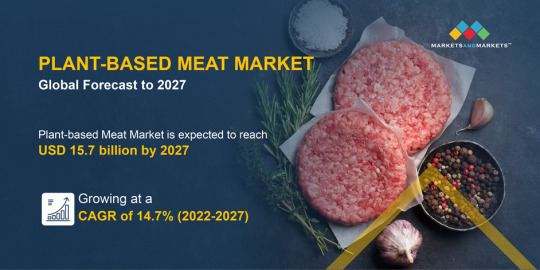
Download PDF Brochure: https://www.marketsandmarkets.com/pdfdownloadNew.asp?id=44922705
The food retail segment among distribution channels is estimated to have the largest market
Based on the distribution channel, the food retail segment is estimated to account for the largest share of the plant-based meat market in 2022. Food retail refers to operating retail, supermarkets, hypermarket stores, and other stores where various products, such as grocery items, vegetables, uncooked meat, and frozen products, are made available to consumers. The distribution channel is already popular among consumers worldwide due to the wide availability of various products. Therefore, this distribution channel is being used by established plant-based meat companies and startups to increase the penetration of their products in the market, making it the largest segment during the forecast period in the plant-based meat market.
The burger patties segment is projected to grow at the highest CAGR in the plant-based meat market during the forecast period
By product, the plant-based meat market is segmented into burger patties, strips & nuggets, sausages, meatballs, and other products. The other products include slices, fillets, cutlets, fingers, and crumbles. Burgers are generally very popular among consumers globally, particularly in North America. With the growing veganism trend and health consciousness, the demand for plant-based burgers is on the rise. The segment has been dominating the market historically and is expected to continue doing so during the forecast period, making it the fastest-growing product segment in the plant-based meat market.
Europe region holds the largest share in the plant-based meat market
The European plant-based meat market accounted for the largest market share in 2020. This dominance is attributed to the rising health concerns among consumers regarding meat products and the exponentially growing veganism trend in the region. Furthermore, European plant-based meat manufacturers focus on developing innovative products backed by appropriate research and development facilities available in the region. Several European retailers and supermarkets have added plant-based meat products to their product range to cater to the rising demand for plant-based meat products across the region.
Top Companies in Plant-based Meat Market
Key players in this market include Beyond Meat (US), Kellogg Company (US), Impossible Foods Inc. (US), Maple Leaf Foods (Canada), Unilever (UK), Conagra Foods (US), Tofurky (US), Gold&Green Foods Ltd (Finland), Sunfed (New Zealand), and Monde Nissin (Philippines).
Beyond Meat (US), a Delaware Corporation is one of the biggest alternative protein brands offering a portfolio of plant-based meats. The company markets the plant-based product via three categories: beef, pork, and poultry. Beyond Meats range of plant-based meat products can be categorized into four segments: Beyond Burgers, Beyond Sausage, Beyond Beef, and Beyond Beef Crumbles. The company has a wide presence in the US. Its factories are in Columbia and Missouri of the US.
Impossible Foods Inc., (us), manufactures plant-based products by observing animal products at the molecular level and selects specific proteins and nutrients from greens, seeds, and grains to recreate meat and dairy products. Impossible Foods Inc. has its first large-scale food manufacturing site located in Oakland, California. The countries where the company has its presence include the US, Canada, Hong Kong, Macau, and Singapore.
#Plant-based Meat Market#Plant-based Meat#Plant-based Meat Market Size#Plant-based Meat Market Share#Plant-based Meat Market Growth#Plant-based Meat Market Trends#Plant-based Meat Market Forecast#Plant-based Meat Market Analysis#Plant-based Meat Market Report#Plant-based Meat Market Scope#Plant-based Meat Market Overview#Plant-based Meat Market Outlook#Plant-based Meat Market Drivers#Plant-based Meat Market Industry
0 notes
Text
Vegan Products for Beginners: Tips, Brands, and Nutritional Insights
Introduction to Vegan Products
Hey there! Have you ever wondered what all the buzz about Vegan Products is? Well, you’re in the right place. Let’s dive into the world of vegan products, which are items that do not contain any animal-derived ingredients. Veganism isn’t just a diet; it’s a lifestyle choice that prioritizes compassion and sustainability. Whether you’re a curious newbie or a seasoned vegan, this guide will walk you through everything you need to know about vegan products.
History of Veganism
Early Beginnings
The roots of veganism can be traced back to ancient civilizations that advocated for non-violence towards animals. However, the modern vegan movement began in 1944 when Donald Watson coined the term “vegan” and co-founded the Vegan Society in the UK. This marked a significant shift in how people perceived and practiced plant-based living.
Evolution Over the Decades
Since the 1940s, veganism has evolved from a niche dietary choice to a mainstream movement. The rise of environmental awareness, animal rights activism, and health consciousness has propelled veganism into the spotlight, leading to a surge in demand for vegan products.
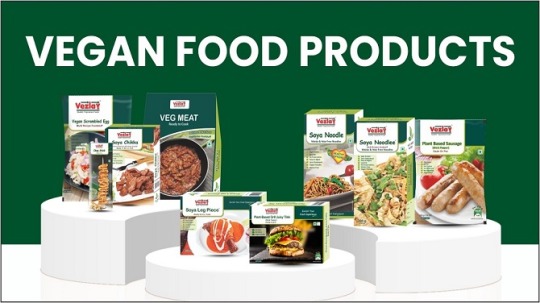
Types of Vegan Products
Food and Beverages
Plant-based Proteins
Gone are the days when vegans struggled to find protein sources. Today, plant-based proteins like tofu, tempeh, and seitan offer delicious and nutritious alternatives to meat. Brands like Beyond Meat and Impossible Foods have revolutionized the market with their meat substitutes that mimic the taste and texture of traditional meat.
Dairy Alternatives
Whether it’s almond milk in your coffee or cashew cheese on your pizza, dairy alternatives have made it easier than ever to enjoy creamy, delicious products without the guilt. Oatly and Daiya are just two of the many brands offering fantastic dairy-free options.
Personal Care Items
Vegan Skincare
Looking for cruelty-free beauty products? Vegan skincare brands like The Body Shop and Herbivore Botanicals ensure that you can pamper your skin without harming animals. These products often feature natural, plant-based ingredients that are gentle on your skin and the environment.
Haircare Products
Vegan haircare is another booming industry. Brands like Lush offer shampoos, conditioners, and styling products that are free from animal-derived ingredients and harsh chemicals.
Clothing and Accessories
Vegan Leather
Say goodbye to leather made from animal hides. Vegan leather, often made from materials like polyurethane or innovative alternatives like pineapple leaves (Piñatex), offers a stylish and ethical option for fashion lovers. Brands like Matt & Nat lead the way in chic, sustainable vegan accessories.
Sustainable Fabrics
Sustainable fabrics such as organic cotton, bamboo, and hemp are making waves in the vegan clothing industry. These materials are not only eco-friendly but also incredibly comfortable and stylish.
Household Products
Cleaning Supplies
Cleaning your home can be ethical too! Vegan cleaning supplies from brands like Seventh Generation and Method ensure that no animals are harmed in the process of keeping your space spotless.
Home Decor
Vegan home decor is an emerging trend, with products like cruelty-free candles, plant-based paints, and sustainable furniture gaining popularity among conscious consumers.
Benefits of Using Vegan Products
Health Benefits
Nutritional Advantages
Vegan products often pack a nutritional punch. Plant-based diets are rich in vitamins, minerals, and antioxidants, which can help boost your immune system and overall health.
Reduced Risk of Chronic Diseases
Studies have shown that a vegan diet can reduce the risk of chronic diseases such as heart disease, diabetes, and certain cancers. By choosing vegan products, you’re not just being kind to animals but also to your body.
Environmental Benefits
Lower Carbon Footprint
Animal agriculture is a significant contributor to greenhouse gas emissions. By opting for vegan products, you can significantly reduce your carbon footprint and help combat climate change.
Conservation of Resources
Producing plant-based foods requires fewer resources like water and land compared to animal agriculture. This means that choosing vegan products helps conserve vital resources and promotes sustainability.
Ethical Benefits
Animal Welfare
One of the primary motivations for many vegans is animal welfare. By using vegan products, you contribute to reducing the demand for animal exploitation and cruelty.
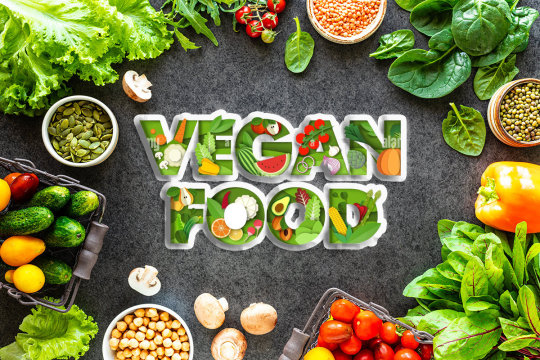
Human Rights Considerations
The vegan movement also intersects with human rights issues, advocating for fair labor practices and the ethical treatment of workers in the supply chain.
Challenges of Vegan Products
Accessibility and Availability
While vegan products are becoming more mainstream, they may still be hard to find in some areas. Rural or less-developed regions might have limited options compared to urban centers.
Price Differences
Vegan products can sometimes be more expensive than their non-vegan counterparts. This price disparity can be attributed to various factors, including production costs and market demand.
Mislabeling and Greenwashing
Not all products labeled as “vegan” are truly vegan. Some companies engage in greenwashing, using misleading claims to appear more eco-friendly than they are. It’s essential to research and verify product labels to ensure authenticity.
How to Identify Authentic Vegan Products
Reading Labels
Become a label detective! Look for clear indications that a product is vegan. Ingredients lists and allergy information can provide clues about the product’s contents.
Recognizing Certifications
Vegan Society Trademark
The Vegan Society Trademark is a reliable certification that ensures a product is free from animal ingredients and has not been tested on animals.
PETA-Approved Vegan
PETA’s certification is another trusted mark that guarantees the ethical standards of vegan products.
Top Vegan Food Brands
Beyond Meat
Beyond Meat is famous for its plant-based burgers that taste incredibly similar to beef. Their products are a fantastic way to enjoy familiar flavors without compromising on your values.
Oatly
Oatly offers a range of oat-based dairy alternatives, from milk to ice cream. Their products are delicious, sustainable, and perfect for those who are lactose intolerant or vegan.
Tofurky
Tofurky provides a variety of plant-based meats that are perfect for everything from sandwiches to holiday feasts. Their products are a staple in many vegan households.
Daiya
Daiya specializes in dairy-free cheeses that melt, stretch, and taste like the real thing. Their products are great for anyone craving cheesy goodness without the dairy.
Top Vegan Personal Care Brands
The Body Shop
The Body Shop is a well-known brand offering a wide range of vegan and cruelty-free skincare, haircare, and makeup products.
Lush
Lush is renowned for its handmade, ethical cosmetics. Their vegan products are fresh, fragrant, and perfect for pampering yourself.
Herbivore Botanicals
Herbivore Botanicals combines natural ingredients with luxury skincare. Their products are vegan, cruelty-free, and packaged in eco-friendly materials.
Top Vegan Clothing Brands
Stella McCartney
Stella McCartney is a high-fashion brand committed to sustainability. They offer stylish, cruelty-free clothing and accessories made from innovative materials.
Matt & Nat
Matt & Nat are pioneers in vegan leather goods. Their bags, wallets, and accessories are not only chic but also environmentally friendly.
Vaute Couture
Vaute Couture focuses on creating high-quality vegan fashion. Their products are designed with both ethics and aesthetics in mind.
Incorporating Vegan Products into Your Lifestyle
Transitioning Tips
Making the switch to vegan products doesn’t have to be daunting. Start small by gradually replacing non-vegan items with their vegan counterparts.
Meal Planning with Vegan Foods
Meal planning can simplify your transition. Explore vegan recipes, plan your meals for the week, and make a shopping list to ensure you have all the ingredients you need.
DIY Vegan Personal Care Recipes
Why not try making your own vegan personal care products? There are plenty of DIY recipes online for everything from face masks to shampoo.
Debunking Myths About Vegan Products
Nutritional Deficiencies
One common myth is that vegan diets lack essential nutrients. However, with careful planning, you can get all the nutrients you need from plant-based sources.
Taste and Texture Issues
Many people believe that vegan products don’t taste as good or have a strange texture. Thanks to advancements in food technology, this is no longer the case. Many vegan products taste just as good, if not better, than their non-vegan counterparts.
Limited Options
The notion that veganism limits your options is outdated. The market is brimming with a variety of vegan products that cater to every need and preference.
Future Trends in Vegan Products
Technological Advancements
Technology is playing a crucial role in the vegan industry. Innovations like lab-grown meat and advanced plant-based proteins are set to revolutionize the market.
Emerging Markets
Veganism is gaining traction worldwide, with emerging markets in Asia, Africa, and Latin America showing significant growth in vegan product demand.
Innovations in Food Science
Food science continues to push the boundaries, creating vegan products that are more delicious and nutritious than ever before. From cultured dairy to plant-based seafood, the future looks bright.
Vegan Products and the Economy
Market Growth
The vegan market is experiencing exponential growth. As more consumers embrace veganism, the demand for vegan products continues to rise.
Job Creation
The growth of the vegan market has led to job creation in various sectors, from agriculture to manufacturing to retail.
Economic Impact
The shift towards veganism has a positive economic impact, promoting sustainable practices and ethical business models that benefit society as a whole.
How to Support the Vegan Movement
Advocacy and Awareness
Spread the word! Share information about the benefits of veganism and vegan products with your friends and family.
Supporting Vegan Businesses
Put your money where your mouth is by supporting vegan businesses. This helps promote ethical practices and encourages more companies to adopt cruelty-free methods.
Personal Actions and Lifestyle Changes
Every small change counts. Whether it’s adopting Meatless Mondays or switching to vegan skincare, your actions can make a big difference.
Conclusion
To wrap it up, Vegan Food Products offer a plethora of benefits, from health and environmental advantages to ethical considerations. While there are some challenges, the growing market and increasing accessibility make it easier than ever to embrace a vegan lifestyle. So why not give it a try? Start incorporating vegan products into your daily routine and be part of the change for a better world.
3 notes
·
View notes
Text
Too Early to Market or not a good Product?
To stay competitive, companies are constantly innovating, introducing new products that might fail for various reasons. The question is: Are these products simply too early for the market, or are they just not good enough to meet customer needs?
Sigma, a Mexican company, developed a new product under a new brand in 2012. The product was a ready-to-eat meat item, containing just over half beef and the rest soy protein, targeting low-income consumers by offering them a cost-effective way to afford meat more than twice a week. However, shortly after its launch, the product was discontinued due to low sales.
Today, with the rise of the flexitarian trend, which encourages the consumption of more plant-based proteins and a reduction in meat, Sigma has decided to relaunch the product at the beginning of 2024, hoping that this new trend will boost sales.
Let's see what happens at the end of the year. Was Sigma too early to market, or was the product simply not appealing enough to consumers? Or could it be that Sigma's positioning strategy wasn't effective?

2 notes
·
View notes
Text
Buy Vegan Products Online: A Healthy and Delicious Choice
The need for vegan products is rising in a world where people are becoming more and more health-conscious. Customers are actively looking for alternatives made from plants that satisfy their nutritional needs and moral requirements while still eating well. Vezlay is an organization that stands out in the vegan product market. We'll go about the benefits of buying Vezlay Products Online in this article, especially for people who want to go vegan without offering flavor or quality.
The Rise of Veganism
Embracing a Plant-Based Lifestyle
Veganism is not just a trend; it's a lifestyle choice that has gained significant momentum in recent years. More people are choosing to adopt a plant-based diet for various reasons, including ethical concerns, environmental impact, and health benefits. As the popularity of veganism grows, so does the demand for high-quality vegan products.

Vezlay: A Pioneer in Vegan Delicacies
Crafting Delicious Alternatives
Vezlay has established itself as a pioneer in crafting delicious vegan alternatives to traditional meat-based products. From plant-based chicken nuggets to meatless kebabs, Vezlay offers a diverse range of options that cater to different tastes and preferences.
Quality Ingredients, Superior Taste
What sets Vezlay apart is its commitment to using quality ingredients that not only mimic the taste and texture of meat but also provide essential nutrients. The superior taste of Vezlay Products makes them a favorite among both seasoned vegans and those transitioning to a plant-based lifestyle.
Why Buy Vezlay Products Online?
Convenience at Your Fingertips
Seamless Online Shopping Experience
One of the significant advantages of buying Vezlay Products online is the convenience it offers. With just a few clicks, you can explore a wide range of vegan delicacies, place your order, and have it delivered to your doorstep. This seamless online shopping experience eliminates the need to visit multiple stores in search of your favorite vegan products.
Diverse Product Range
Explore and Discover
Vezlay's online platform provides a comprehensive catalog of vegan products, allowing you to explore and discover new items. Whether you're a fan of classic vegan burgers or eager to try innovative plant-based recipes, Vezlay has something for everyone.
Exclusive Online Offers
Savings and Discounts
By choosing to buy Vezlay products online, you may have access to exclusive offers, discounts, and promotions. Online platforms often run special deals that can help you save money while enjoying your favorite vegan treats.
Making the Switch: A Personal Journey
From Traditional to Vegan
A Flavorful Transition
Making the switch to a vegan lifestyle can be a flavorful journey, especially with brands like Vezlay making it accessible and enjoyable. Share your personal journey of transitioning from traditional meat-based meals to delicious and satisfying vegan alternatives.
Health Benefits of Vezlay Products
Nourishing Your Body
Vezlay products not only taste great but also offer numerous health benefits. Packed with plant-based proteins, vitamins, and minerals, these products contribute to overall well-being. Share insights into the nutritional value of Vezlay products and how they can be a valuable addition to a balanced diet.
Conclusion
Buying Vezlay products online is a delightful journey into the world of veganism. With a diverse range of delicious options, seamless online shopping, and the health benefits they offer, Vezlay has become a go-to choice for individuals looking to make a positive change in their dietary habits. Embrace a tasty and compassionate lifestyle by incorporating Vezlay products into your daily meals.
2 notes
·
View notes
Text
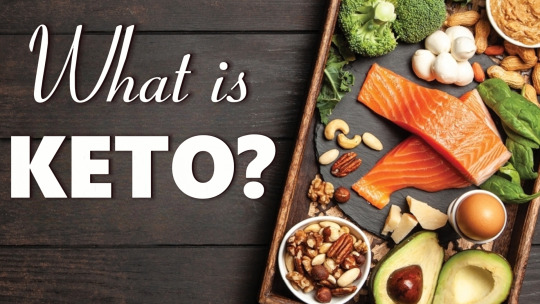
Today, we're diving into the world of health and nutrition to explore a trending diet that's been gaining a lot of attention lately. Keto! We are unraveling the Mystery of the ketogenic diet and why its popularity is growing so rapidly around the globe. So, without further ado, let's jump right in!
Keto is a low-carb, high-fat way of eating that has been shown to have numerous health benefits.
The primary goal of the ketogenic diet is to put your body into a state of ketosis. Ketosis occurs when your body switches from using glucose for energy to burning fat instead. By doing this, your body becomes a fat-burning machine, helping you lose weight and improve your overall health.
So, how exactly does the ketogenic diet work? Well, it's all about macronutrient balance. On a standard diet, our bodies rely on carbohydrates as the main source of fuel. However, when you restrict carbs and increase your fat intake, your body enters this state of ketosis and starts producing ketones. These ketones are then used as fuel for the brain and body.
Let's break it down into three key elements: low-carb, moderate protein, and high fat.
The low-carb aspect of Keto involves limiting your carbohydrate intake to around 20–50 grams per day, depending on your personal goals and health factors. This means cutting out sugary foods, grains, and starchy vegetables, while focusing on healthier options like leafy greens, avocados, and berries.
Moderate protein – it's important to consume a moderate amount while on Keto. This is because excess protein can actually be converted into glucose, which can potentially hinder ketosis. Prioritizing lean meats, fish, and plant-based protein sources will help you maintain the right balance.
Lastly, the high-fat aspect of Keto. Healthy fats like avocado oil, coconut oil, and olive oil become your new best friends. These fats not only provide energy but also keep you feeling satisfied and full. It's important to emphasize good fats and avoid unhealthy sources like processed oils.
Now that we understand the basics, let's talk about the potential benefits of the ketogenic diet.
1. Weight loss – The ketogenic diet has been shown to be highly effective for weight loss due to its ability to control hunger hormones and encourage fat metabolism.
2. Improved mental focus – Ketones are a great source of fuel for the brain, which can lead to improved cognitive function and mental clarity.
3. Increased energy levels – By relying on fat instead of carbs for energy, many Keto followers report feeling more energized throughout the day.
4. Better blood sugar control – Since carbohydrates significantly impact blood sugar levels, reducing carb intake can help maintain a stable blood sugar level and potentially benefit those with diabetes.
5. Decreased inflammation – Studies have shown that the ketogenic diet reduces inflammation in the body, which is associated with various health conditions.
As with any diet, though, it's important to consider the potential drawbacks or challenges of going Keto.
While the ketogenic diet can be highly effective for weight loss and offer numerous benefits, it requires careful planning to ensure nutrient adequacy and avoid deficiencies. That's why a personalized keto meal plan have been proven to make all the difference. But which meal plan is the right one for you? To find the answer to that question can be quite overwhelming, and unfortunately, many Keto programs do not deliver what they promise.
However, In preparation to this article, our team has done a lot of research, and we have listed just below what we think are the 3 best and effective personalized keto programs on the market right now. Just click on the links to check them out.
We hope you find this information helpful, Also, if you have any questions or personal experiences with the ketogenic diet, feel free to contact us or leave a comment down below – we'd love to hear from you!
#ketodiet#ketofood#lowcarb#healthydiet#weightlossjourney#ketolifestyle#ketocommunity#ketorecipes#ketogenicdiet#keto
2 notes
·
View notes
Text
Top 10 trending foods in USA
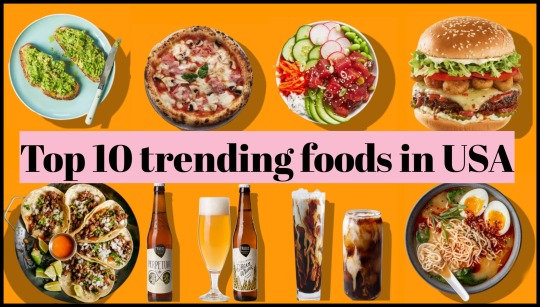
Here are some trending foods in the US that you will love. We will discuss in detail about the trending foods through this post and talk about the quality of
Below is a list of 10 trending foods in the United States
Avocado toast
Plant-based meat alternatives
Poke bowls
Gourmet burgers
Artisanal pizzas
Craft beer
Korean barbecue
Ramen
Street tacos
Cold brew coffee
Avocado toast
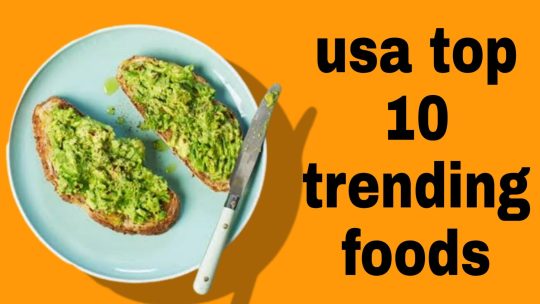
Avocado toast is a simple and popular breakfast or brunch dish in the United States. It typically consists of mashed avocado spread on top of a slice of toasted bread, often sourdough or whole wheat, and seasoned with salt, pepper, and sometimes lemon juice.
Additional toppings may include sliced tomatoes, microgreens, feta cheese, bacon, or a poached egg. The dish has gained popularity in recent years due to the rise in popularity of avocados, which are a nutrient-dense fruit rich in healthy fats and fiber. Avocado toast is also often marketed as a healthy and easy meal option for people with busy lifestyles.
Plant-based meat alternatives
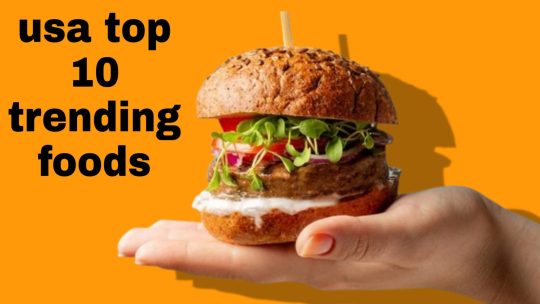
Plant-based meat alternatives are food products designed to mimic the taste, texture, and appearance of traditional meat products, but made entirely from plant-based ingredients. They have become increasingly popular in the United States as more people adopt vegan, vegetarian, and flexitarian diets, and as concerns grow about the environmental and ethical impact of animal agriculture.
Some popular plant-based meat alternatives in the US include Beyond Meat, Impossible Foods, and Lightlife. These products are made using a variety of ingredients such as pea protein, soy protein, wheat gluten, and beet juice, which are processed and combined to create a meat-like texture and flavor.
Plant-based meat alternatives are often marketed as a healthier, more sustainable, and more ethical alternative to traditional meat. They are also popular among consumers who are looking for ways to reduce their carbon footprint, as animal agriculture is a significant contributor to greenhouse gas emissions. While plant-based meat alternatives are not necessarily healthier than traditional meat, they do offer a viable alternative for those who are looking to reduce their meat intake without sacrificing taste or convenience.
Poke bowls
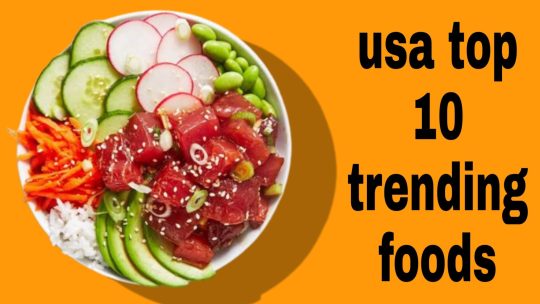
Poke bowls are a popular Hawaiian dish that has become increasingly popular in the United States in recent years. They typically consist of cubes of raw fish, usually tuna or salmon, served over a base of rice or salad greens, and topped with various vegetables, sauces, and seasonings.
The term “poke” means “to slice” in Hawaiian, and the dish is believed to have originated in Hawaii as a way for fishermen to use up the less desirable parts of their catch. Today, poke bowls have evolved into a trendy and healthy meal option, and can be found in many restaurants and food trucks across the US.
Poke bowls are often customizable, with many different variations available. Some popular ingredients include avocado, seaweed, cucumber, edamame, and spicy mayo sauce. Poke bowls are often marketed as a healthy and fresh option, as they typically feature high-quality, nutrient-dense ingredients such as fish and vegetables. They can also be a good source of protein and healthy fats, making them a popular meal option among health-conscious consumers.
Artisanal pizzas

Artisanal pizzas are pizzas that are made by skilled craftspeople using high-quality, fresh, and often locally-sourced ingredients. These pizzas are typically hand-crafted, with attention paid to every detail, from the crust to the toppings. Artisanal pizza makers may use traditional techniques, such as wood-fired ovens, to give the pizzas a unique, authentic flavor.
Artisanal pizzas are often associated with the “farm-to-table” movement, which emphasizes the use of locally-sourced, sustainable ingredients. The toppings on artisanal pizzas can vary widely, from classic margherita with fresh tomato sauce, mozzarella cheese, and basil, to more innovative combinations such as smoked salmon and cream cheese, or roasted vegetables with goat cheese.
In recent years, artisanal pizza has become increasingly popular, with many restaurants and pizzerias offering their own unique takes on this classic dish. Some artisanal pizzerias have even gained national and international recognition for their high-quality, innovative pizzas.
Craft beer
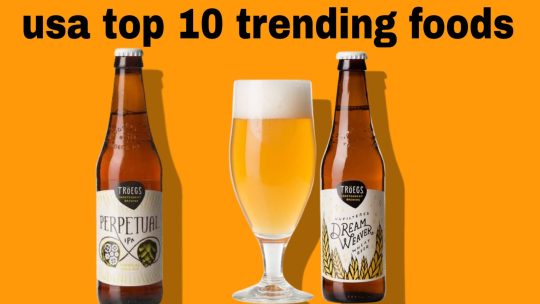
Craft beer is a type of beer that is brewed in small batches using traditional brewing methods and high-quality ingredients, often sourced locally. Craft beer is typically produced by independent breweries that are small in scale, with a focus on producing unique and flavorful beers that offer a departure from the mass-produced beers that dominate the market.
The craft beer movement began in the 1970s and has since grown into a major industry, with thousands of independent breweries operating around the world. These breweries often experiment with different ingredients, brewing techniques, and flavor profiles to create beers that appeal to a wide range of tastes.
Craft beer is known for its wide variety of styles, ranging from hoppy IPAs and rich stouts to tart sours and crisp lagers. Many craft breweries also offer limited edition or seasonal beers, often made with unique or unusual ingredients, to keep their offerings fresh and exciting.
The popularity of craft beer has also given rise to beer tourism, with many breweries offering tours and tastings for visitors. Craft beer festivals and events have also become popular, with beer lovers gathering to sample different brews and celebrate the art of craft brewing.
Top 10 trending foods in USA
Korean barbecue
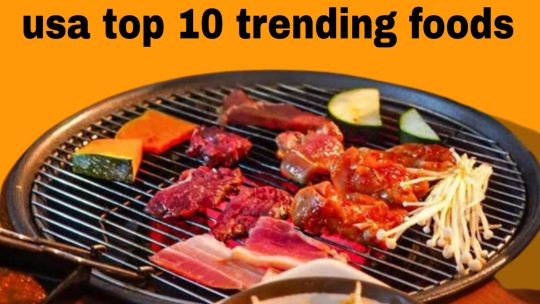
Korean barbecue, also known as “gogi-gui” in Korean, is a popular style of Korean cuisine that involves grilling meat, typically beef, pork, or chicken, at the table. The meat is usually marinated in a sweet and savory sauce before being grilled, and it is often accompanied by various side dishes such as kimchi, pickled vegetables, and rice.
Korean barbecue is typically cooked on a grill or griddle that is built into the table, allowing diners to cook the meat themselves and enjoy it hot off the grill. It is a social and interactive dining experience, as everyone at the table takes part in cooking and sharing the food.
Some of the most popular types of Korean barbecue meat include bulgogi (thinly sliced beef marinated in a soy sauce-based marinade), galbi (beef short ribs marinated in a sweet and savory sauce), and samgyeopsal (thick slices of pork belly). Other types of meat, such as chicken, duck, and seafood, can also be cooked in this style.
Korean barbecue has become increasingly popular around the world, and there are now many Korean barbecue restaurants that serve this delicious and flavorful cuisine.
Ramen
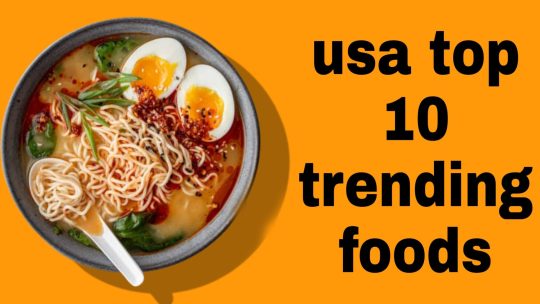
Ramen is a Japanese noodle soup dish that has become popular around the world. It typically consists of Chinese-style wheat noodles served in a savory broth that is often made with meat or fish, soy sauce, miso paste, and other seasonings. Ramen can be served in a variety of styles, such as shoyu (soy sauce-based), shio (salt-based), tonkotsu (pork bone-based), and miso (soybean paste-based), each with its unique flavor profile.
Ramen is usually served with a variety of toppings, such as sliced pork, boiled egg, green onions, and nori seaweed, although toppings can vary depending on the regional or personal preference. It is also common to add garlic, chili oil, or other condiments to adjust the flavor to taste.
Ramen is enjoyed both in casual settings, such as food stalls, as well as in more formal restaurants. It is a popular comfort food in Japan and has gained a following worldwide, with many Ramen shops opening up in major cities.
Street tacos
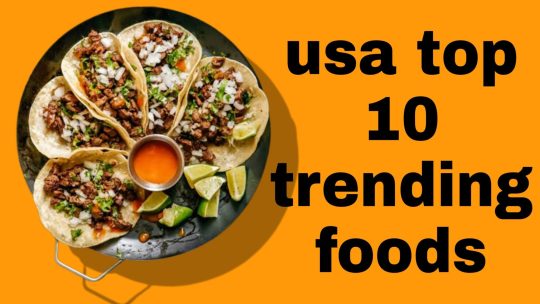
Street tacos are a popular type of taco commonly found in Mexico and in Mexican-American communities in the United States. They are typically served on soft corn tortillas and filled with a variety of grilled or roasted meats, such as beef, pork, chicken, or shrimp, as well as vegetables.
The meat is often marinated with a variety of spices and seasonings, and then grilled over an open flame or on a griddle, giving it a smoky and slightly charred flavor. Common toppings for street tacos include chopped onions, cilantro, avocado, and a squeeze of lime, although the toppings can vary depending on the region or personal preference.
Street tacos are often served in a casual outdoor setting, such as food trucks or outdoor markets, and are usually sold at an affordable price. They are a favorite of many people for their portability and ease of eating on the go, as well as their delicious and authentic flavors.
Cold brew coffee

Cold brew coffee is a type of coffee that is brewed with cold or room temperature water, rather than hot water. The process of making cold brew coffee involves steeping coffee grounds in cold water for an extended period of time, usually between 12 and 24 hours, which allows the coffee to slowly infuse into the water, creating a rich and smooth flavor.
Cold brew coffee is typically less bitter and acidic than hot-brewed coffee, which makes it appealing to many people who find hot coffee too harsh or acidic. It is also served cold or over ice, which makes it a refreshing and popular drink during the summer months.
Cold brew coffee can be made using a variety of coffee beans, including light, medium, and dark roast. The coffee can be enjoyed black or with milk, cream, or sugar added to taste.
Cold brew coffee has become increasingly popular in recent years and is now commonly available at coffee shops and cafes around the world, as well as being available in pre-made bottles and cans in grocery stores.
2 notes
·
View notes